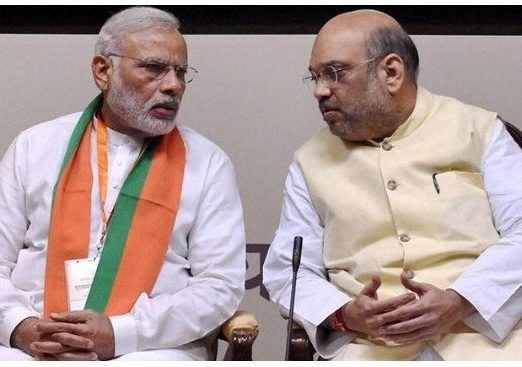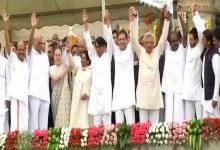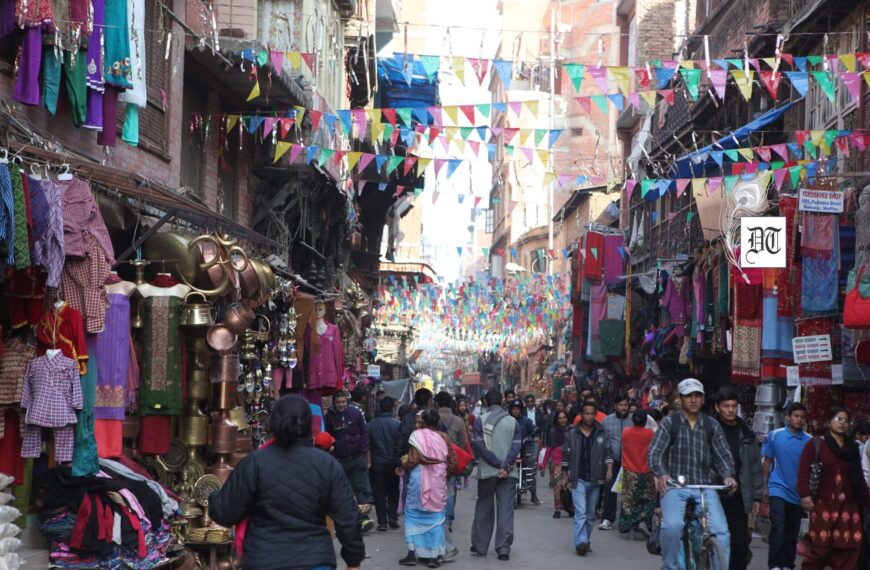Modi and Shah have been treating themselves as the first among the equals. Party sources even maintain that, barring four or five leaders, none dares to speak out on their face. Modi talks of internal democracy, but he interacts only with a group of his favourite leaders. He even does not care for elderly leaders. All other leaders have to wait for a hearing with Modi. The Modi-Shah combine rules the party and the government. All others are treated like non-entities. A report, for Different Truths.
The night before B S Yeddyurappa was to take oath as the BJP chief minister of Karnataka, reopening the gate to southern India for his party, some senior RSS ideologues and leaders called the RSS chief and expressed their serious reservation on the means resorted to by Narendra Modi and Amit Shah to get majority and protect the government.
These leaders, supposed to be the eyes and ears of the Sangh Parivar, conveyed the peoples’ perception about Modi-Shah design to foist Yeddy. They told their chief the common people reviled these tactics of the duo. In the peoples’ eyes, this was the most unethical and illegal action with the potential to subvert the Constitution and damage the democratic character of the country. Their action would simply endorse the Opposition accusation that the saffron outfit was moving in the direction of doing away with democratic functioning and creating Hindu Rashtra.
What really incensed the leadership was the impression that both the leaders were trying to assert their independent identities and stature. No doubt RSS has been keen to have a saffron government in Karnataka, but it was against any kind of horse trading or poaching. Senior leaders held the view that if some legislators from opposition parties were willing on their own to join the BJP and extend support to Yeddy, they should definitely be welcome. But no message must go from the party side that it was applying force or pressurising them.
Modi and Shah have been treating themselves as the first among the equals. Party sources even maintain that, barring four or five leaders, none dares to speak out on their face. Modi talks of internal democracy, but he interacts only with a group of his favourite leaders. He even does not care for elderly leaders. All other leaders have to wait for a hearing with Modi. The Modi-Shah combine rules the party and the government. All others are treated like non-entities.
It is a fact that BJP under Modi and Shah has raised the bar. During the last four years of Modi rule, while the BJP has emerged as the number one political party, it has also succeeded in dictating the dimension of Indian politics. Barring southern India, BJP, along with its allies, is in power across 75% of India’s geographical expanse, governing over 68% of the Indian population. But it is the pain of not being a pan-Indian party that has been hurting Modi and Shah. They dreamt of ruling India at any cost.
It was for this reason that they were ready to resort to any action irrespective of whether it was illegal or undemocratic. In a recently-held meeting, Amit Shah had assured top RSS leaders at its headquarters in Nagpur that the party would certainly win Karnataka elections. If the Sangh sources are to be believed, this has raised the element of suspicion among the RSS leadership. Though RSS has refused to get actively involved in the election process, it has allowed the swayamsevaks to work for BJP on the plea that if democracy has to be strengthened, a large number of people should come in the open to exercise their votes to elect right candidates.
Nevertheless, the manner and means resorted to by the two leaders simply strengthened the perception of the Sangh leadership that both the gentlemen were set to weaken democracy. Though on May 19, the day he resigned, Yeddyurappa tried to enact an Atal Bihari Vajpayee, he miserably failed as he utterly lacked that Atal-touch.
While Vajpayee’s 1996 resignation speech was marked by a passionate defence of his party and its ideals with humorous digs at its opponents that drew wide appreciation and even applause from the Opposition, Yeddyurappa launched a tirade against the Congress-Janata Dal-Secular alliance.
Just after receipt of this cautionary message, word was sent to Modi and Shah to refrain from this exercise. They relented reluctantly. Their dream to attain the status of being a pan-India organization was shattered. Incidentally, Shah could not digest the defeat. He still nurses a hurt feeling. Even after five days of the aborted move, Shah claimed, “They will lose their majority if the MLAs are released even now as MLAs are uncomfortable with the tie-up between erstwhile adversaries.”
The actions of Modi and Amit Shah show that for satisfying their ego they can go to any extent. Rahul Gandhi was not wrong in saying: “The Prime Minister’s model of leadership is not democratic, it is of a dictator. Karnataka has shown to the BJP that power is not everything. The will of the people is everything. Purchase of MLAs was authorised by the Prime Minister.”
What a paradox that Narendra Modi was voted to power on the promise of ending corruption. But he has disappointed. This will undoubtedly dent his image in the 2019 general election. Modi’s popularity is a key factor in BJP’s rise. But a lot more remains to be done for the party to sustain this.
Arun Srivastava
©IPA Service
Photo from the Internet





 By
By

